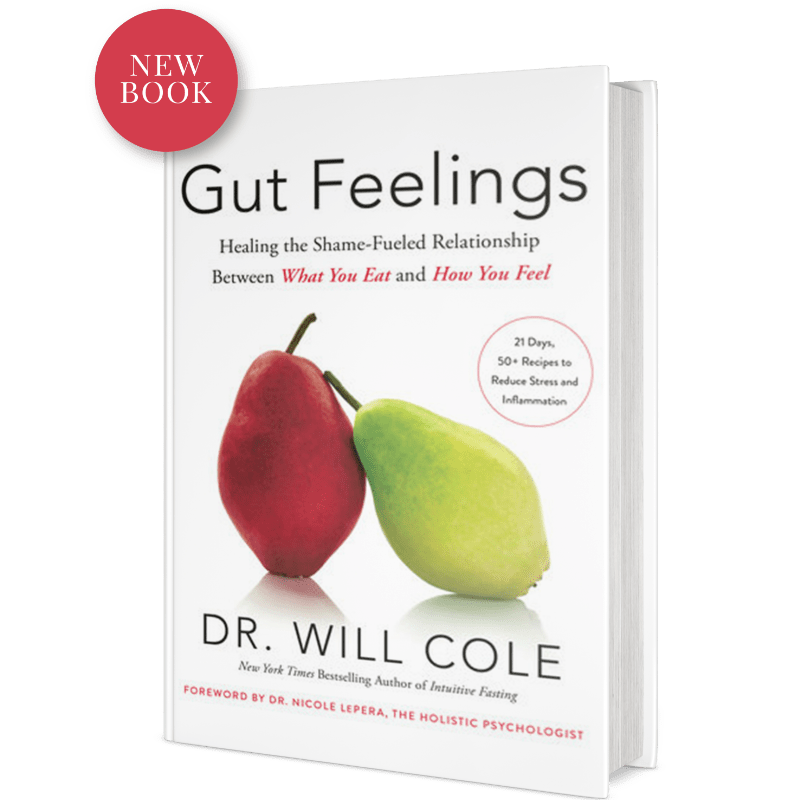Is Shameflammation Sabotaging Your Health? Exactly How To Restore Your Gut-Feelings Connection

In my telehealth functional medicine clinic, I spend my days helping people around the world restore their mental and physical health. Throughout the years I’ve seen just how influential your thoughts, stress, and past trauma are on your physical health.
Unfortunately, the mind-body connection (the link between your physical and emotional health) is often ignored in mainstream medicine. However, there have been many studies confirming the significance of this connection by showing that anxiety, depression, PTSD, and other mental health problems are connected to physical health factors like gut health, inflammation, and diet.
So after years of seeing the physical impact of emotional suffering in my patients with no real acknowledgement, I decided to give it its own name: Shameflammation.
What is shameflammation?
Shameflammation is a combination of shame and inflammation with each one affecting the other. Shame is one of the most common underlying emotions found in people with chronic stress and unresolved past trauma (1) that can leave you feeling anxious, hopeless, overwhelmed, and just plain disconnected from your intuition. In fact, studies (2) have even found that shame can impact your ability to heal from sickness, make healthy choices, and stay healthy overall with some researchers describing shame as “insidious, pervasive, and pernicious.” (3)
As a functional medicine practitioner, I talk a lot about inflammation. While inflammation is an important biological process that helps us heal from injuries or pathogens like a flu virus or harmful bacteria, it can quickly spiral out of control and become chronic due to lifestyle factors like poor diet, toxins, and emotions like stress, trauma, and shame. It’s this chronic inflammation that can lead to mental health problems like anxiety, brain fog, and depression.
What are the signs + symptoms of shameflammation?
Mental health problems like depression, PTSD, and anxiety are some of the top signs that your emotions are affecting your health in a negative way. However, there are many different symptoms beyond just mental health problems that I look at to determine whether or not shameflammation is a factor in your health. This is because your mental health can impact your physical health and lead to symptoms beyond emotional health.
- Chronic pain
- Hormone imbalances
- Brain fog
- Feeling disconnected from your intuition (especially with food)
- Autoimmune conditions
- Heart palpitations
- Chronic fatigue
- Digestive distress (chronic constipation, bloating, gas, diarrhea)
- Insomnia
- Mood swings
- Low libido
- Weight loss resistance
- Sudden weight loss
- Lack of motivation
- Feelings of overwhelm (especially with food)
READ MORE: How Chronic Inflammation Wrecks Your Health + What To Do About It
How to start taming shameflammation
The first step to taming shameflammation? Restoring your gut-feelings connection. In order to do this we need to focus on foods our gut loves, as well as practices like self-compassion that are kind to our mind.
A study in the scientific journal Brain, Behavior, and Immunity (4) looked at the impact of self-compassion and its influence on the relationship between the brain, inflammation, and mental stress. The study took 41 healthy adults and had them participate in math and public speaking - two things that would put most people under intense stress! After the exercise, researchers took samples of the participants blood and found that the longer they had to speak or do math, the higher their IL-6 inflammation levels were. They repeated this exact exercise the next day and found that the participants IL-6 levels were even higher than the first day!
But what does this have to do with self-compassion? Even though inflammation was high overall, the participants who had more self-compassion and greater self-acceptance had the lowest overall inflammation levels in response to the stressful exercises. Talk about a powerful message! While stress, shame, inflammation, and shameflammation might be inevitable in our daily lives, we can actually have influence over the degree that we are negatively impacted the more that we practice kindness and acceptance with ourselves.
Ultimately, shameflammation can be tamed by slowing down and reconnecting with yourself. In my book Gut Feelings, I have put together a protocol that includes mindfulness practices like breathwork, gratitude, meditation, somatic work, and sefl-compassion along with nourishing and grounding recipes with a variety of superfoods that work together to nurture your gut-brain connection and heal your relationship with yourself, your body, and food. Doing this begins a process shifting your view of health and wellness - instead of shame, health and healing is a form of self-respect!
As I often tell my patients: You can’t heal a body you hate. That journey to loving, grace-filled, nourishing wellness doesn’t happen overnight, but it’s so worth it.
As one of the first functional medicine telehealth clinics in the world, we provide webcam health consultations for people around the globe.
READ NEXT: A Functional Medicine Perspective On Microdosing, A Guide To Practicing EFT (Emotional Freedom Technique) Tapping
Start Your Health Journey Today
FUNCTIONAL MEDICINE CONSULTATIONS FOR PEOPLE AROUND THE WORLD
- López-Castro, Teresa et al. “Association Between Shame and Posttraumatic Stress Disorder: A Meta-Analysis.” Journal of traumatic stress vol. 32,4 (2019): 484-495. doi:10.1002/jts.22411
- Trindade, Inês A et al. “Chronic Illness-Related Shame: Development of a New Scale and Novel Approach for IBD Patients' Depressive Symptomatology.” Clinical psychology & psychotherapy vol. 24,1 (2017): 255-263. doi:10.1002/cpp.2035
- Dolezal, Luna, and Barry Lyons. “Health-related shame: an affective determinant of health?.” Medical humanities vol. 43,4 (2017): 257-263. doi:10.1136/medhum-2017-011186
- Breines, Juliana G et al. “Self-compassion as a predictor of interleukin-6 response to acute psychosocial stress.” Brain, behavior, and immunity vol. 37 (2014): 109-14. doi:10.1016/j.bbi.2013.11.006
The information on this website has not been evaluated by the Food & Drug Administration or any other medical body. We do not aim to diagnose, treat, cure or prevent any illness or disease. Information is shared for educational purposes only. You must consult your doctor before acting on any content on this website, especially if you are pregnant, nursing, taking medication, or have a medical condition.
Our content may include products that have been independently chosen and recommended by Dr. Will Cole and our editors. If you purchase something mentioned in this article, we may earn a small commission.

BY DR. WILL COLE
Dr. Will Cole, DNM, IFMCP, DC is a leading functional medicine expert who consults people around the globe, starting one of the first functional medicine telehealth centers in the world. Named one of the top 50 functional and integrative doctors in the nation, Dr. Will Cole provides a functional medicine approach for thyroid issues, autoimmune conditions, hormonal imbalances, digestive disorders, and brain problems. He is also the host of the popular The Art of Being Well podcast and the New York Times bestselling author of Intuitive Fasting, Ketotarian, Gut Feelings, and The Inflammation Spectrum.

Gut Feelings
Healing The Shame-Fueled Relationship
Between What You Eat And How You Feel




